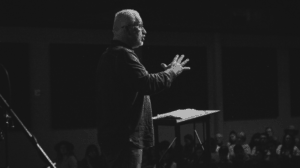I grew up with the presupposition that missionaries were some type of “super-Christians”. Their devotion seemed to place them in a higher category of believers. However, that belief started to change when I turned nineteen. I had the opportunity to go on an international mission trip
This mission trip took me from the United States to Costa Rica. Our team was made up of youth and college leaders. We went to rural areas to repair a school and some homes. I also led worship and spent time mentoring young boys and girls.
While on this trip I realized that just because I was involved in missions, I was no “super-Christian.” I was just like my peers. My decision to do more mission work brought with it a desire to model how other believers could be involved in global missions without leaving their home church.
I am now thirty-eight and a lot has changed since my first mission trip. I am married. My beautiful wife and I have served in five countries. We have established roots in East Asia. Our home church and other churches are involved in our global ministry.
How do you lead your church to embrace global missions? Let me give you six ways that you can be involved in missions, apart from serving on the ground.
These six ways form an acronym using the word, GLOBAL.
G: Gain insight
Immediately after Paul’s conversion he preached the Gospel among the Gentiles. In Galatians 1:17 Paul said, “I did not go up to Jerusalem to see those who were apostles before I was, but I went to Arabia. Later I returned to Damascus.” He spent three years prior to his return to Jerusalem. In the verse before, he quoted his passion to preach the Gospel. I’m convinced he gained more knowledge about the Gentiles during this three-year period.
You don’t have to go to another area around the world and stay there for three years to get started in missions. However, you can gather all types of information through mission agencies such as the International Mission Board, Presbyterian Mission International, MANNA Worldwide, Campus Crusade, and much more. Learn how they uniquely support and send their missionaries.
L: Locate a missionary
Have you ever heard the old adage: “It takes one to know one?” Find a missionary in your area that has a heart for global missions. If you searched the website of any of the agencies above, you can find a missionary to connect with. Reach out to them and invest time getting to know them. In Romans 16, Paul detailed the names and information about the believers he came into contact with while on his journeys. The church of Rome spent time with Paul, you can also find a missionary to invest in.
O: Observe his or her work
Spend time getting to know your selected missionary’s work. You need to investigate by asking questions. The apostle Paul expended a lot of time defending his calling (Gal. 1:18-20; Rom. 9:1-5; 2 Cor. 11).
Here are several categories of questions you can ask:
First, ask about their calling
- How did you come to faith in Christ?
- How were you called to become a missionary?
- What kind of advice would you give someone who wanted to be a missionary?
Second, ask about their ministry
- What does your daily work look like?
- What have been some of your greatest victories?
- What are some of the greatest challenges you have faced and will face?
- How can we help you achieve your goals?
Lastly, seek out prayer requests and intercede for them
- How can I pray for you?
- Is there anything or anyone in need of God’s help?
- How can I pray for your family?
B: Boldly give and share in their faith journey
Beyond prayer, a missionary’s greatest need is money. Most missionaries give up their lives to serve the Lord in a foreign culture. In 1 Timothy 5:18, Paul tells Timothy, “You shall not muzzle the ox while he is threshing.” This passage serves as a reminder to not take advantage of a pastor’s work. In most cases not only does the missionary sacrifice his daily wages to serve in missions, but his family does as well.
Make sure you boldly give and invest in their faith journey.
A: Adopt a nation
After gaining insight, locating a missionary, and spending time learning about their work, it’s time to adopt a nation. The easiest way is to be drawn to the missionary you have been observing. For example, if your missionary does work in the heart of China (where approximately only four percent are believers), you can commit to daily intercession for the nation of China.
Currently, my church hosts an event each month called Ta Ethne. After our second service, we bring in a global missionary to speak. We provide information about different countries in need of the gospel. We provide lunch and pray for the missionary afterward. Emails and text message reminders can be sent to the church during the following weeks to remind church members to pray for these missionaries.
A good reminder comes from Jeremiah 29:7. God reminded a remnant of Israel to pray for the nation that had taken them into exile. “Pray to the Lord for it, because if it prospers, you too will prosper” (Jer. 29:7b). Christians around the world are in need of God’s intervention. If this was true for Israel, then this is true for them. Pray for the nations.
L: Love a people group
Finally, find a people group and love them. A good book to read is An Insider’s Guide to Praying for the World by Brian C. Stiller. This book is filled with information about the nations as well as specific needs of the unreached and unengaged people groups around the world.
You can also check with the missionary agencies I mentioned earlier. Another great website is Voice of the Martyrs. You can sign up for a free newsletter and find prayer requests for persecuted Christians.
My prayer is that you will gain a new passion for men and women around the world who give up their lives to share the gospel and that you will become active in supporting missionaries around the world.



